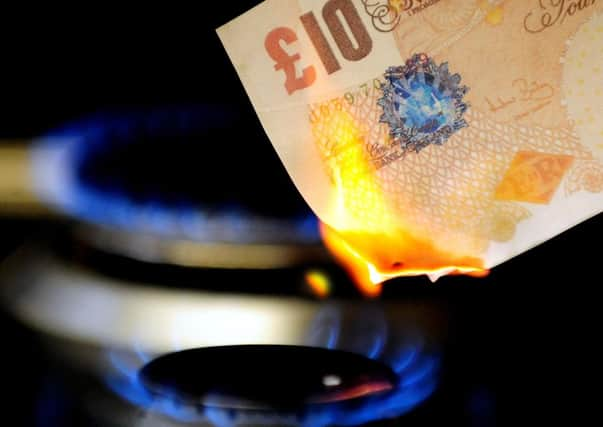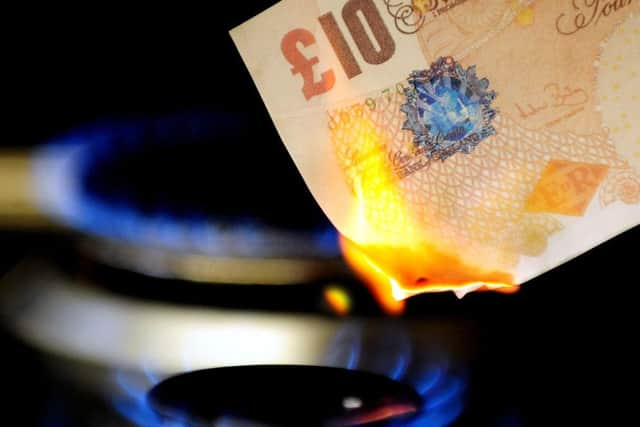Rural Yorkshire left out in cold as fuel poverty hits one in four


More people in the remotest parts of the region will be hit as incomes continue to be outstripped by spiralling energy bills over the coming years, the Rural Voluntary and Community Sector (VCS) Policy Group said.
Its prediction came as Energy Secretary Ed Davey ordered suppliers to stop treating customers as “cash cows” at the Energy UK conference after EDF became the fifth of the “Big Six” to announce a price rise this year.
Advertisement
Hide AdAdvertisement
Hide AdIt also coincides with a warning from the National Audit Office (NAO) today that consumers face another 17 years of above-inflation increases in energy bills to offset the cost of renewing Britain’s ageing infrastructure.


Ryedale has the highest rate of fuel poverty in the region with 26 per cent of households forced to spend at least 10 per cent of their income on heating, according to a policy paper published by the Rural VCS Policy Group today.
The next highest rates are in Richmondshire (24.3 per cent), Craven (23.6 per cent), Scarborough (22.7 per cent) and Hambleton (20.6 per cent) – all well above the regional and national average.
Overall, 17.7 per cent of households in Yorkshire are in fuel poverty compared with 14.6 per cent nationally, latest figures show.
Advertisement
Hide AdAdvertisement
Hide AdRural Yorkshire is particularly vulnerable to fuel poverty as local jobs are typically seasonal and low-paid, the report warns. Workers in Ryedale are the region’s lowest earners with an average salary of just £16,442.
“Rural areas are often perceived to be where the wealthy live. However, deprivation in rural areas is often hidden,” the report states.
Homes in the countryside are also typically old and less well insulated than modern properties, while two in five are off the gas grid and depend on more costly forms of fuel such as oil, it adds.
“Government support for insulation and other energy efficiency activity should be ramped up, not reduced, and appropriate measures sought for the types of homes found in rural areas,” the report said.
Advertisement
Hide AdAdvertisement
Hide AdSome communities have benefitted from setting up fuel co-operatives so oil can be bulk-bought, but others are restricted by the minimum levels oil companies will deliver – typically 500 litres at an average of 60p per litre, it notes.
“Pressure needs to be brought to bear upon the oil companies to be more flexible so people who are struggling financially can still receive oil to keep their homes warm,” the report states.
Alternative energy sources such as biomass boilers, ground and air source heat pumps and hydropower schemes should also be explored to ensure the rising price of fossil fuels does not compound the problem in the long term, it adds.
The report concludes: “With benefit reductions and wages stagnating, incomes over the next few years will continue to be outstripped by the rate of increases in energy bills. Fuel poverty, instead of being eradicated by 2016, is set to rise if urgent action is not taken and vulnerable, rural people will be among the worst affected.”
Advertisement
Hide AdAdvertisement
Hide AdThe issue is a particular concern due to the ageing population in the region’s countryside.
Older people are three times more likely to die in the winter in a cold home than in a warm one and are also at higher risk of illnesses such as heart and respiratory diseases, the report warns.
Health issues associated with fuel poverty cost the NHS an estimated £1.36bn annually across the UK, according to Age UK.
Conservative MP Anne McIntosh, whose Thirsk, Malton and Filey constituency covers Ryedale, said: “We live in one of the most beautiful but regrettably one of the coldest parts of the country in the winter months.
Advertisement
Hide AdAdvertisement
Hide Ad“People are saying to me locally they can only afford to heat one room and you shouldn’t have to make that choice.
“We need to review the structure of the energy industry, we need to have better competition and we need a better, tighter regulatory authority so any price increase has to be reasonable and linked to improvements for the consumer.”
The 3.9 per cent price hike announced by EDF yesterday pushes its average standard variable tariff up by £49 annually to £1,300 and reports suggested E.ON would follow suit by the end of the month with a 6.6 per cent price rise.
In his speech yesterday, Mr Davey warned energy firms they faced the same “reputational fate” as the banks unless the industry reformed.
Advertisement
Hide AdAdvertisement
Hide Ad“The industry needs a reasonable rate of return, because without profit we won’t get investment and without investment we risk a return to blackout Britain,” he said.
“But those profits cannot come at the expense of the elderly, the vulnerable and the poorest in our society. Customers are not just cash cows to be squeezed in the pursuit of a higher return for shareholders, and frankly the latest round of bill rises have not been fully and openly justified.”
Defending the hikes, Energy UK chief executive Angela Knight blamed Government-imposed levies and taxes and rising network costs.
“Energy bills have risen for well-known reasons, reasons that the industry has made quite clear,” she said.
Advertisement
Hide AdAdvertisement
Hide AdIn a stark warning today, the NAO said the Government had little idea how much energy and water bills would rise as a result of future infrastructure investment.
The Treasury estimates at least two-thirds of the £310bn work planned over the next decade and beyond will come from private companies paid for, ultimately, by consumers through utility bills.
The NAO said such high levels of investment meant increases in charges for energy and water were now expected to continue to outstrip inflation until 2030.
The head of the NAO, Amyas Morse, said Ministers needed to know at what point the continuing price rises would become too much for consumers to bear.
Advertisement
Hide AdAdvertisement
Hide Ad“Government and regulators do not know the overall impact of planned infrastructure on future consumer utility bills, or whether households, especially those on low incomes, will be able to afford to pay them,” he said.
“It seems critical to know ‘how much is too much’, based on reliable information.”
Reiterating his pledge that a Labour government would freeze energy prices until 2017, the party’s leader and MP for Doncaster North, Ed Miliband, said: “Hot air from this Government won’t keep people warm this winter.
“The reason prices are still rising is because this Government refuses to act on overcharging by the energy companies.”